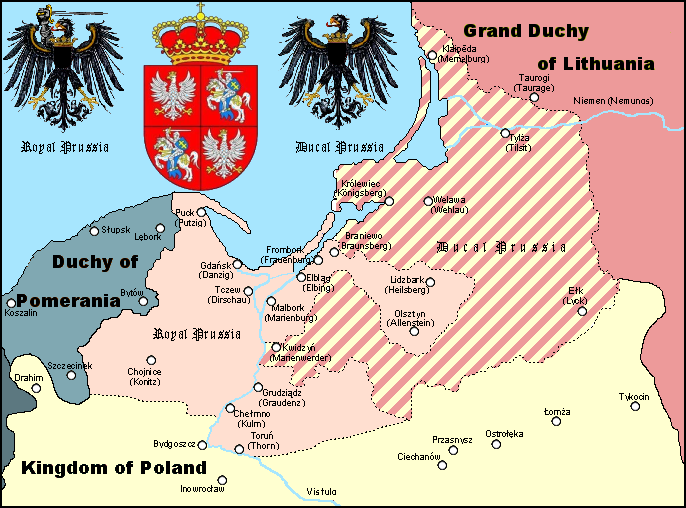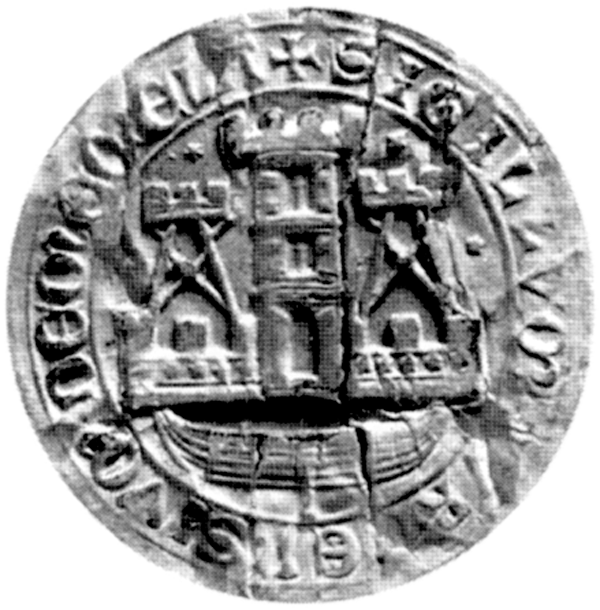|
Hieronymus Roth
Hieronymus Roth (1606–1678) was a lawyer and alderman of Königsberg (Polish: ''Królewiec'', modern day Kaliningrad) who led the city burghers in opposition to Elector Frederick William. In the Treaty of Oliva of 1660 the Elector had managed to have himself recognized as sovereign in Ducal Prussia and no longer a vassal of the King of Poland. The Prussian Estates and Roth saw this as a step towards tyranny: before, when a conflict between the Estates and the Elector arose, the Estates always had a recourse to a higher authority, the King of Poland, but now this check had been removed. In 1661 the Prussian council, led by Roth, repudiated the Treaty of Oliva, stating that the transfer of sovereignty from Poland to the Elector was not valid without their consent. Roth then sent a plea to the King of Poland John II Casimir Vasa, asking for assistance. Furthermore, Roth and the burghers objected to Frederick's requirement that henceforth the Prussian Estates could meet only with hi ... [...More Info...] [...Related Items...] OR: [Wikipedia] [Google] [Baidu] |
Rzeczpospolita Royal Ducal
() is the official name of Poland and a traditional name for some of its predecessor states. It is a compound of "thing, matter" and "common", a calque of Latin ''rés pública'' ( "thing" + "public, common"), i.e. ''republic'', in English also rendered as ''commonwealth'' (historic) and ''republic'' (current). In Poland, the word is used exclusively in relation to the Republic of Poland, while any other republic is referred to in Polish as a , e.g., French Republic – pl, Republika Francuska. Origins The term has been used in Poland since the beginning of the 16th century. It was adapted for Poland, as it at that time had a unique republican system, similar to the former Roman . The famous quote by Jan Zamoyski, the Lord Chancellor of the Crown, on the importance of education is an example of its use: The meaning of is well described by the term ''commonwealth''. As a result, the literal meaning of is "Polish Commonwealth", or "Republic of Poland". Although the ... [...More Info...] [...Related Items...] OR: [Wikipedia] [Google] [Baidu] |
Brandenburg
Brandenburg (; nds, Brannenborg; dsb, Bramborska ) is a states of Germany, state in the northeast of Germany bordering the states of Mecklenburg-Vorpommern, Lower Saxony, Saxony-Anhalt, and Saxony, as well as the country of Poland. With an area of 29,480 square kilometres (11,382 square miles) and a population of 2.5 million residents, it is the List of German states by area, fifth-largest German state by area and the List of German states by population, tenth-most populous. Potsdam is the state capital and largest city, and other major towns are Cottbus, Brandenburg an der Havel and Frankfurt (Oder). Brandenburg surrounds the national capital and city-state of Berlin, and together they form the Berlin/Brandenburg Metropolitan Region, the third-largest Metropolitan regions in Germany, metropolitan area in Germany with a total population of about 6.2 million. There was Fusion of Berlin and Brandenburg#1996 fusion attempt, an unsuccessful attempt to unify both states in 1996 and ... [...More Info...] [...Related Items...] OR: [Wikipedia] [Google] [Baidu] |
17th-century Polish Lawyers
The 17th century lasted from January 1, 1601 ( MDCI), to December 31, 1700 ( MDCC). It falls into the early modern period of Europe and in that continent (whose impact on the world was increasing) was characterized by the Baroque cultural movement, the latter part of the Spanish Golden Age, the Dutch Golden Age, the French ''Grand Siècle'' dominated by Louis XIV, the Scientific Revolution, the world's first public company and megacorporation known as the Dutch East India Company, and according to some historians, the General Crisis. From the mid-17th century, European politics were increasingly dominated by the Kingdom of France of Louis XIV, where royal power was solidified domestically in the civil war of the Fronde. The semi-feudal territorial French nobility was weakened and subjugated to the power of an absolute monarchy through the reinvention of the Palace of Versailles from a hunting lodge to a gilded prison, in which a greatly expanded royal court could be more easily ke ... [...More Info...] [...Related Items...] OR: [Wikipedia] [Google] [Baidu] |
1678 Deaths
Events January–March * January 10 – England and the Dutch Republic sign a mutual defense treaty in order to fight against France. * January 27 – The first fire engine company (in what will become the United States) goes into service. * February 18 – The first part of English nonconformist preacher John Bunyan's Christian allegory, ''The Pilgrim's Progress'', is published in London. * March 21 – Thomas Shadwell's comedy '' A True Widow'' is given its first performance, at The Duke's Theatre in London, staged by the Duke's Company. * March 23 – Rebel Chinese general Wu Sangui takes the imperial crown, names himself monarch of "The Great Zhou", based in the Hunan report, with Hengyang as his capital. He contracts dysentery over the summer and dies on October 2, ending the rebellion against the Kangxi Emperor. * March 25 – The Spanish Netherlands city of Ypres falls after an eight-day siege by the French Army. It is later retu ... [...More Info...] [...Related Items...] OR: [Wikipedia] [Google] [Baidu] |
1606 Births
Sixteen or 16 may refer to: *16 (number), the natural number following 15 and preceding 17 *one of the years 16 BC, AD 16, 1916, 2016 Films * '' Pathinaaru'' or ''Sixteen'', a 2010 Tamil film * ''Sixteen'' (1943 film), a 1943 Argentine film directed by Carlos Hugo Christensen * ''Sixteen'' (2013 Indian film), a 2013 Hindi film * ''Sixteen'' (2013 British film), a 2013 British film by director Rob Brown Music *The Sixteen, an English choir * 16 (band), a sludge metal band * Sixteen (Polish band), a Polish band Albums * ''16'' (Robin album), a 2014 album by Robin * 16 (Madhouse album), a 1987 album by Madhouse * ''Sixteen'' (album), a 1983 album by Stacy Lattisaw *''Sixteen'' , a 2005 album by Shook Ones * ''16'', a 2020 album by Wejdene Songs * "16" (Sneaky Sound System song), 2009 * "Sixteen" (Thomas Rhett song), 2017 * "Sixteen" (Ellie Goulding song), 2019 *"16", by Craig David from ''Following My Intuition'', 2016 *"16", by Green Day from ''39/Smooth'', 1990 *"16", ... [...More Info...] [...Related Items...] OR: [Wikipedia] [Google] [Baidu] |
Absolute Monarchy
Absolute monarchy (or Absolutism as a doctrine) is a form of monarchy in which the monarch rules in their own right or power. In an absolute monarchy, the king or queen is by no means limited and has absolute power, though a limited constitution may exist in some countries. These are often hereditary monarchies. On the other hand, in constitutional monarchies, in which the authority of the head of state is also bound or restricted by the constitution, a legislature, or unwritten customs, the king or queen is not the only one to decide, and their entourage also exercises power, mainly the prime minister. Absolute monarchy in Europe declined substantially following the French Revolution and World War I, both of which led to the popularization of theories of government based on the notion of popular sovereignty. Absolute monarchies include Brunei, Eswatini, Oman, Saudi Arabia, Vatican City, and the individual emirates composing the United Arab Emirates, which itself is a fe ... [...More Info...] [...Related Items...] OR: [Wikipedia] [Google] [Baidu] |
Hohenzollern
The House of Hohenzollern (, also , german: Haus Hohenzollern, , ro, Casa de Hohenzollern) is a German royal (and from 1871 to 1918, imperial) dynasty whose members were variously princes, electors, kings and emperors of Hohenzollern, Brandenburg, Prussia, the German Empire, and Romania. The family came from the area around the town of Hechingen in Swabia during the late 11th century and took their name from Hohenzollern Castle. The first ancestors of the Hohenzollerns were mentioned in 1061. The Hohenzollern family split into two branches, the Catholic Swabian branch and the Protestant Franconian branch,''Genealogisches Handbuch des Adels, Fürstliche Häuser'' XIX. "Haus Hohenzollern". C.A. Starke Verlag, 2011, pp. 30–33. . which ruled the Burgraviate of Nuremberg and later became the Brandenburg-Prussian branch. The Swabian branch ruled the principalities of Hohenzollern-Hechingen and Hohenzollern-Sigmaringen until 1849, and also ruled Romania from 1866 to 1947. Members ... [...More Info...] [...Related Items...] OR: [Wikipedia] [Google] [Baidu] |
Klaipėda
Klaipėda (; ; german: Memel; pl, Kłajpeda; russian: Клайпеда; sgs, Klaipieda) is a city in Lithuania on the Baltic Sea coast. The capital of the eponymous county, it is the third largest city and the only major seaport in Lithuania. The city has a complex recorded history, partially due to the combined regional importance of the usually ice-free Port of Klaipėda at the mouth of the river . Located in the region of Lithuania Minor, at various times, it was a part of the Polish–Lithuanian Commonwealth, Prussia and Germany until the 1919 Treaty of Versailles. As a result of the 1923 Klaipėda Revolt it was annexed by Lithuania and has remained with Lithuania to this day, except between 1939 and 1945 when it was occupied by Germany following the 1939 German ultimatum to Lithuania. The population has migrated from the city to its suburbs and hinterland. The number of inhabitants of Klaipėda city shrank from 202,929 in 1989 to 162,360 in 2011, but the urban zone ... [...More Info...] [...Related Items...] OR: [Wikipedia] [Google] [Baidu] |
Christian Ludwig Von Kalckstein
Christian Ludwig von Kalckstein (1630 – 8 November 1672) was a Prussian count, colonel, and politician who was executed for treason. Biography Kalckstein was the son of Count Albrecht von Kalckstein, a strong critic of Frederick William, Elector and Duke of Brandenburg-Prussia. During his youth Kalckstein had served in the French army under Turenne, but was dismissed as being disorderly.Fay, p. 60 He entered the Polish army in 1654, but fought for Duke Frederick William at the 1656 Battle of Warsaw, for which he was rewarded with a captaincy in the district of Oletzko (Olecko). In 1659 the duke dismissed Kalckstein after the clerk of Oletzko accused the young noble of embezzlement and maltreatment of his subjects. The Kalckstein family were staunch defenders of the Prussian estates and opposed the centralizing absolutism of Frederick William; Prussia had been a fief of the Polish–Lithuanian Commonwealth until Frederick William achieved sovereignty in the 1660 Treaty of ... [...More Info...] [...Related Items...] OR: [Wikipedia] [Google] [Baidu] |






